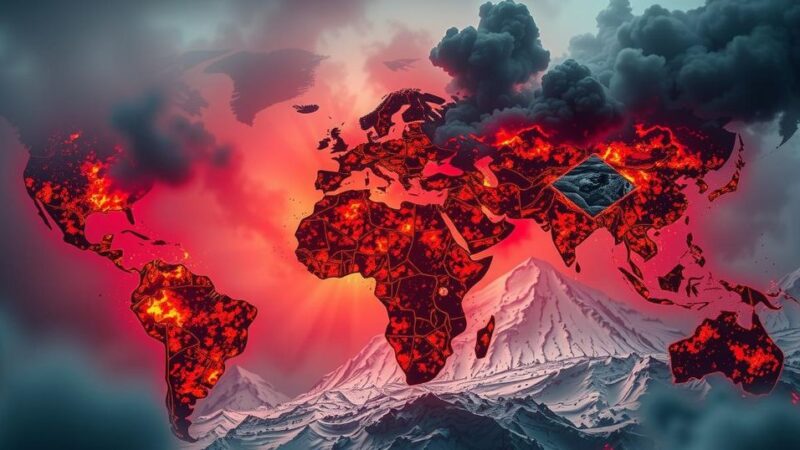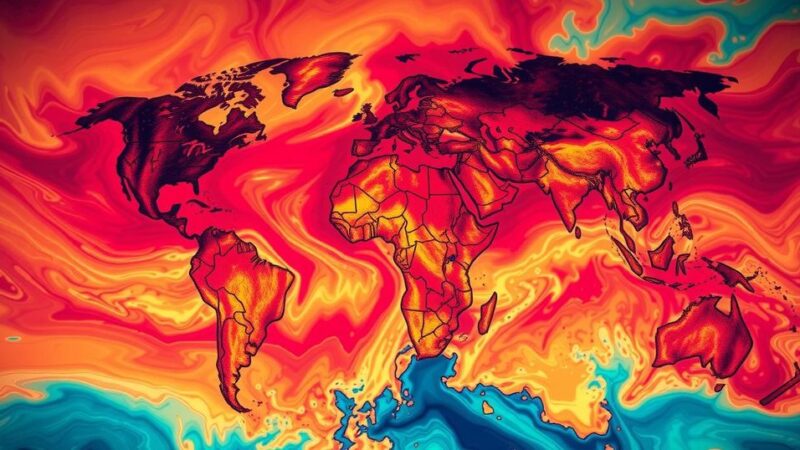The year 2024 witnessed catastrophic climate events, including extreme heat, severe flooding, destructive hurricanes, and debilitating droughts across the globe. The impact of these disasters has led to significant human casualties, economic losses estimated at $310 billion, and highlighted the urgent need for action against climate change. Experts warn we are entering a dangerous new era of amplified climate events.
In 2024, unprecedented climate challenges emerged globally, impacting regions as diverse as impoverished Mayotte and affluent Saudi Arabia. This year has been recorded as the hottest on record, with elevated atmospheric and oceanic temperatures fueling extreme weather events worldwide. World Weather Attribution concluded that nearly every analyzed disaster over the past year was exacerbated by climate change, underlining the stark reality faced in contemporary times. “The impacts of fossil fuel warming have never been clearer or more devastating than in 2024. We are living in a dangerous new era,” stated climate scientist Friederike Otto from the WWA network.
Tragic human losses were starkly observed in June when heat-related deaths at the Muslim hajj pilgrimage in Saudi Arabia soared past 1,300, with temperatures reaching a staggering 51.8 degrees Celsius (125 degrees Fahrenheit). Across the globe, extreme heat, identified as a ‘silent killer’, resulted in numerous fatalities in nations such as Thailand, India, and the United States. The intensity of the heat was so severe in Mexico that howler monkeys perished from the trees, and in Pakistan, millions of children were kept from school as temperatures surpassed 50 degrees Celsius.
In addition to extreme heat, climate change has instigated hazardous flooding. Warmer oceans increase evaporation and moisture-laden air, leading to extreme rainfall. In April, the United Arab Emirates experienced two years of rain in just one day, paralyzing Dubai’s international airport. Kenya faced catastrophic floods after emerging from a generational drought, resulting in the deaths of more than 1,500 individuals in West and Central Africa and leaving four million people in need of humanitarian assistance. Countries such as Afghanistan, Russia, Brazil, China, Nepal, Uganda, India, Somalia, Pakistan, Burundi, and the United States also reported significant flooding incidents this year.
The frequency and intensity of cyclones surged in 2024 as warmer ocean surfaces intensified tropical storms, leading to notable hurricanes in the United States and the Caribbean. The Philippines endured six major storms in November alone, following Typhoon Yagi earlier that season. December brought Cyclone Chino, which intensified to a Category 4 storm, causing widespread devastation in Mayotte.
Conversely, other regions experienced extreme drought and wildfires. The Americas faced severe drought conditions with millions of hectares in the western United States, Canada, and even parts of the Amazon contributed to large-scale wildfires. Between January and September 2024, over 400,000 fires were reported across South America, creating severe air quality issues. According to the World Food Programme, 26 million individuals in southern Africa are now at risk of hunger due to prolonged drought conditions.
The economic repercussions of these extreme weather events are staggering, with a global damage estimation of $310 billion, primarily attributed to flooding in Europe, particularly in Spain, and the hurricanes in the U.S. Government figures indicated that the United States alone had endured 24 weather disasters in 2024, each resulting in losses exceeding $1 billion. Drought conditions in Brazil led to a $2.7 billion loss in the agriculture sector, and global wine production hit its lowest point since 1961 due to these climatic challenges.
The article discusses the alarming consequences of climate change in 2024, highlighting how rising global temperatures have intensified weather-related disasters across diverse regions. As global warming continues to have a significant impact, the analysis provided by experts underlines how nearly all extreme weather events over the past twelve months have been worsened by human-induced climate change. This report serves to illustrate the need for immediate action to mitigate these environmental challenges affecting vulnerable populations worldwide.
In conclusion, 2024 has been marked by unprecedented climate challenges manifesting in extreme heat, flooding, cyclones, droughts, and wildfires, resulting in significant loss of life and economic damage globally. Experts warn that climate change is exacerbating these disasters, indicating a critical need for robust climate policies and coordinated international efforts to combat its effects. The growing frequency and intensity of these events underscore the urgency of addressing fossil fuel dependency and fostering sustainable practices to protect our planet and its inhabitants.
Original Source: www.rfi.fr







